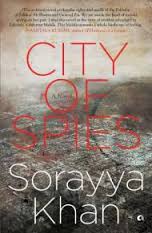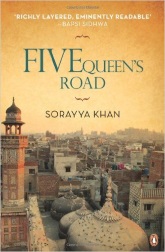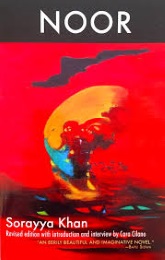
Birth—1962
Where—Vienna
Moved to Islamabad in 1972 with her parents. Graduated from International School
Education—Graduate School of International Studies, Denver
Currently—Lives in New York
Bibliography
-
-
-
Noor (Alhamra Publishing, Islamabad. Penguin India, 2004)
|
Sorayya Khan is a novelist who was born to a Dutch mother and a Pakistani father in Vienna, Austria, grew up in Islamabad, Pakistan, and went to the USA to receive her undergraduate education at Allegheny College and graduate degree in International Studies at the University of Denver, Colorado.
Khan has received a Fulbright award and Constance Saltonstall Foundation Artist Grant to conduct research in Pakistan and Bangladesh for one of her novels. Her story, “In the Shadows of the Margalla Hills,” won the 1995 Malahat Review First Novella prize.
In 2006, she received a Constance Saltonstall Artist Grant, which took her to Banda Aceh, Indonesia, where she interviewed tsunami survivors.
Over the years, her work has been published in various literary quarterlies, including The Kenyon Review and North American Review, and several anthologies.Sorayya Khan is the author of two previous novels, Noor and Five Queen’s Road. Her writing has appeared in several anthologies and literary reviews. She is the recipient of a Fulbright research award, a Malahat Review Novella Prize, and a Constance Saltonstall Artist Grant that took her to post-tsunami Banda Aceh.
Coming to writing in a roundabout way, she’s interested in exploring the intersection between the personal and the political in her fiction.
When she’s not trying to find enough time to write, she’s busy with her two children and Naeem, her husband, who teaches at Ithaca College. She’s also actively involved in Aceh Relief Fund a non-profit organization dedicated to relief work in post-tsunami Aceh.
C ity of Spies (2015) ity of Spies (2015)
Political novels are not every body’s cup of tea. For me, being acquainted with the history of the country the story is set in is a prerequisite, as is a feeling of “connection” with the peoples around whom the political drama unfolds.
 Five Queen’s Road (2009) Five Queen’s Road (2009)
In 1947 Earl Mountbatten, the last Viceroy of India, signed on the dotted line to give independence to the nation of India and like so many of the British living there, he prepared to pack his bags and head home.
 Noor (2006) Noor (2006)
Sorayya Khan opens her novel Noor with two epigraphs.
The first page has these words from Kashmiri poet Agha Shahid Ali: Your history gets in the way of my memory.
On the next page, she recounts — in a few spare sentences — two events from history: the cyclone that hit East Pakistan in November 1970 and the civil war that broke out a few months later between East and West Pakistan
The Sound of Conversation (Sorayya Khan on ‘Why I Write’)
The ancient Miani Sahib graveyard rises and falls like mounds. and we stumble along as if wandering through the crevices of a Lahore topographical map. It has been three years since we’ve visited, but my teenaged son is first to find my father’s grave.
The Silence and Forgetting That Wrote NOOR
In the summer of 1999, I was in Pakistan conducting research for my novel, Noor. Among the people I interviewed was a man who’d retired from the Pakistan army as a Captain and was now selling insurance in Kohat, a tribal area some hours northwest of Islamabad.
Living Colours: A trip down 1970s Islamabad: Sorayya Khan on Islamabad
Q: How has Islamabad changed as a city, from what it was like in the 1970s?
A: Islamabad is a mess of a city now compared to what it was in the 1970s when it still seemed spanking new and wide open. There were few sectors to keep track of, the Islamabad Club was one of the farthest corners, Margalla Road was a single lane in each direction, one Seventh Avenue was a border of the city, and the Blue Area did not exist.
|


 ity of Spies (2015)
ity of Spies (2015) Five Queen’s Road (2009)
Five Queen’s Road (2009)